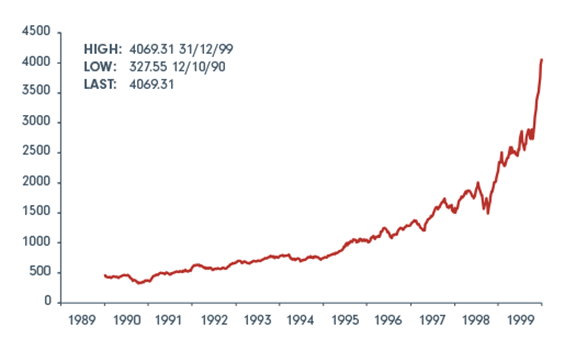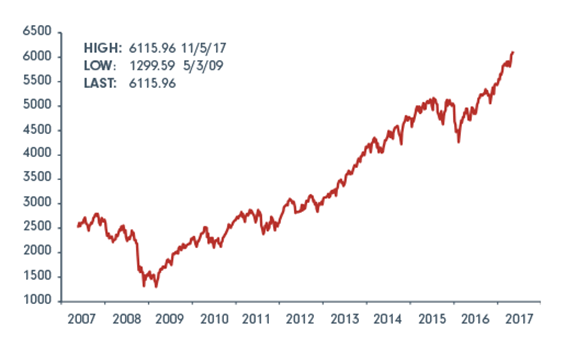This post has been written by Tom Stevenson, investment director with Fidelity International. Stevenson wrote this post for Morningstar Australia from where it has been taken.
There aren't many advantages to being the wrong side of 50. One very clear benefit for investors of a certain age, however, is the fact that, whatever the market turns up, you've already seen something similar.
My two charts are a perfect visual representation of Mark Twain's famous adage that history doesn't repeat itself but it often rhymes.
In both the 10 years to date and the 10 years from 1989 to 1999, the U.S.'s main technology share index, Nasdaq, turned left and headed up the page. For those with the luck or foresight to get in early, this was pure alchemy and a far better way of making money than the dull business of having a job.
Last week, the Nasdaq passed 6,000 for the first time. Inevitably, this milestone triggered a flurry of hand-wringing articles drawing parallels with the dot.com bubble of 17 years ago.
Eight years into a bull market, it's unsurprising that investors should be nervous about a re-run of the calamitous market slide between 2000 and 2003. Having lived and invested through both periods, however, I'm not convinced that we're heading the same way just yet.


Source: Datastream
If you are looking for similarities, of course, you'll find them.
The first is the increasingly narrow focus of the market leadership. Technology stocks account for a disproportionate share of the market gains so far this year--a handful of shares account for about a third of the S&P 500's year-to-date gain.
The five largest US technology companies--Apple, Google-owner Alphabet, Microsoft, Amazon, and Facebook--have seen the value of their shares rise by more than $400 billion in the first four months of 2017. That's roughly the GDP of Austria or Thailand.
Comparing the level of the Nasdaq with that of the S&P 500, a rough gauge of investor enthusiasm for tech stocks compared with the stock market as a whole, the current multiple of about 2.5 is reminiscent of the headiest days of the dot.com boom.
Valuations of tech stocks are also reawakening memories of the blind enthusiasm of the 1990s internet mania when no-one bothered looking at tedious old measures like profits and dividends.
The flotation of Snapchat's parent company recently with a market capitalisation of nearly $30 billion looked pretty crazy to me at the time, so I was unsurprised last week when slightly disappointing user numbers and a bigger-than-expected loss resulted in a 25% fall in the share price. Having soared by over 40% on the first day of trading, however, even that was really just blowing some of the froth away.
Netflix is another good example of a company that we all love to use but might think twice about investing in. Cash is streaming out of the business--at an estimated rate of $2 billion this year. And yet the shares have risen by more than 40% so far in 2017. Investors are focused on the potential of its 100 million subscribers, up by a third in a year. The company is losing money on each of these customers but the market doesn't care, just as it didn't in 1999.
Finally, there's the whiff of capitulation in the air, with even Warren Buffett apologising to Berkshire Hathaway shareholders about his failure to clamber aboard the tech stock bandwagon.
The most dangerous words in investment are "it's different this time," especially when the visual clue in the charts suggests the opposite.
However, there are a few good reasons to think that 2017 is not 1999 redux. So why should we keep the faith with technology stocks for a while longer?
- The key difference between then and now is the massive growth in the internet and the increasing centrality of the web to our lives.
In the late 1990s, only around 300 million people even had access to the internet. Today, 10 times as many do. Then, accessing the web was slow, clunky, and tied you to your desk. Today, we all carry around in our pockets a device with capabilities that we would never have dreamed possible a generation ago.
- The valuations of most tech stocks today are far less scary than they were in 1999. Back then, valuations were rising much more quickly than profits. Today they are falling behind.
The world's biggest company, Apple, trades on around 17 times earnings. Google and Microsoft are priced at roughly 30 times. Back in the day, Microsoft was valued at nearly 50 times earnings, Intel sported a PE ratio of 190, and Oracle 140.
Indeed, comparing today's valuations with those in the 1990s suggests that, on a dot.com clock, we are currently closer to 1997 than 1999.
- A key difference is the sheer scale of the opportunity thanks to new business models enabled by the ubiquity of mobile devices today.
The recent valuation of $50 billion implied by Uber's recent fund-raising may look absurd compared with a global taxi market worth perhaps $11 billion, but enthusiasts argue that this is like trying to value eBay in 1999 against the revenues earned in car boot sales.
Disruptive technologies create value where it never existed before--what if Uber is successful in related areas like food delivery?
- It's worth considering the speed of change that capital-lite business models like AirBnb can achieve.
It took Marriott nearly 90 years to get to 700,000 rooms. AirBnb has reached 1.5 million in just seven years.
My charts make me as nervous as the next investor. What reassures me to a degree is the difference in the mood music between now and 17 years ago. Today's enthusiasm for technology is not really about rose-tinted optimism but a grudging belief that in a sluggish world, the sector is one of the few places that investors can find reliable growth.
The euphoria of 1999 is almost wholly absent.